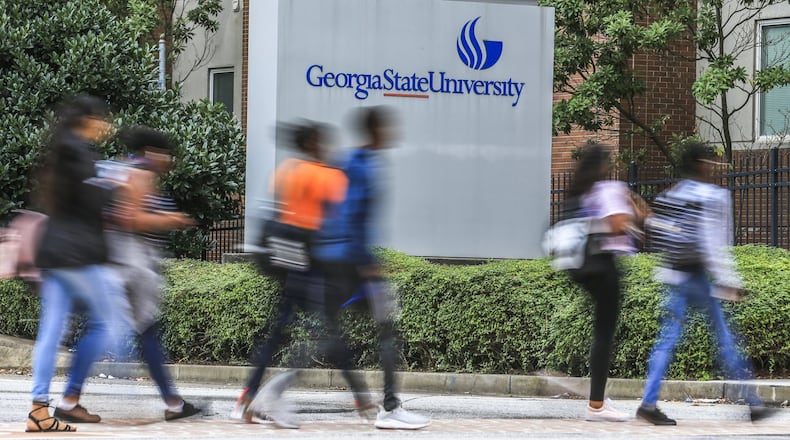Third-year Agnes Scott College student Jessa Rhea is a long way from her hometown of West Des Moines, Iowa — 14 hours by car — but several factors, including a nudge from her mother, convinced her to attend the private, women’s college in Decatur.
The academics, the campus and the opportunity to study abroad during her first semester were other factors, she said.
“I fell in love with it here,” said Rhea, a math major who studied in Canada her first year and will be spending part of this semester in Budapest.
This fall, Agnes Scott reported a record number of first-year students. So, too, did Augusta's Paine College, the University of North Georgia and Georgia State University, which has more students — about 53,000 — than any school statewide. The University System of Georgia, home to the state's largest public colleges, earlier this month reported record enrollment this fall for the fourth consecutive year with nearly 330,000 students.
The enrollment increases in Georgia in recent years contrast with federal government data that show the number of students in the nation’s colleges has declined for six consecutive years, a 6 percent decline of more than 1 million students.
So why is it increasing in Georgia?
There are more young people in the Peach State, and a higher percentage of them are graduating from high school. The percentage of Georgians under 18 has increased steadily, to 24 percent of the state's population, according to U.S. Census Bureau data. Georgia's public high school graduation rate this year was nearly 82 percent, the highest since Georgia began using a federal measure to calculate rates in 2012.
The University System has also increased options in recent years to draw in more students. Out-of-state tuition waivers to attract top students from border states have nearly tripled since 2015. International student enrollment is up about 30 percent over the past five years. Some schools, such as Georgia Tech, are creating more online classes. Its enrollment increased 11 percent from last year.
Other colleges, such as Agnes Scott, are creating more programs to help first-year students determine their potential career paths once they arrive on campus and are offering tantalizing classes, like a first-year course that includes a trip to a city or country in line with their studies. The University System announced earlier this month an effort to expand its study-abroad program.
State leaders have talked constantly in recent years about boosting college enrollment and the importance of graduates being career-ready to compete in high-paying industries to improve the economy. In response, the state Board of Regents approved a plan in March 2015 to allow more high-caliber students from neighboring states to study in Georgia without paying higher out-of-state tuition.
Higher education leaders have also focused more on keeping students in college. The University System has a Complete College Georgia program that offers remedial help to new students. Private colleges such as Clark Atlanta University are encouraging students to take more credit hours as a retention strategy and a way for students to graduate with less student debt. Gordon State College has adopted a similar approach, and officials there said the percentage of first-year students taking 15 or more credit hours per semester has doubled from recent years.
“It’s really been a bigger shift toward not only recruiting students, but retaining them and that’s possibly helping the overall numbers (in Georgia),” said Susan Campbell Lounsbury, director of education data services for the Southern Regional Education Board, an Atlanta-based nonprofit.
Despite the higher enrollment numbers, some say Georgia is missing opportunities to do even better. Thirty-one percent of Georgians between ages 18 and 24 are in college, one of the lowest rates in the nation, researchers from the University of Pennsylvania's Institute for Research on Higher Education said in a report last month. Many Georgians from low-income families are having trouble enrolling and staying in college, the report found.
Georgia and New Hampshire alone among the 50 states do not offer comprehensive state aid programs weighted according to financial need, says the Education Commission of the States. New Hampshire has also showed some increases in enrollments, according to the National Student Clearinghouse Research Center.
Several states are exploring ways to help students who left for various reasons return to college, said Campbell Lounsbury. Georgia must come up some good ideas along that front, she said.
Will college enrollment continue to rise in Georgia? It remains to be seen, University System officials told Regents during a presentation on the numbers. The key, one said, is how well colleges tailor coursework to the needs of students and trends in the workforce.
“I think that book is unwritten and we have a lot of work to do,” said Angela Bell, the system’s vice chancellor for research and policy analysis.
High school graduation rates are expected to plateau in five years and then decline, which may hurt college enrollment.
Georgia has some advantages, though, the SREB’s Campbell Lounsbury said. The state’s Asian and Hispanic population is rising, and projections are it will continue to do so.
At Agnes Scott, about half of students come from outside Georgia. The college began a campaign called SUMMIT that focuses on global learning, believing more students are arriving at college hoping to figure out their role in the world. First-year students also work through their resumes with staff, a calculated effort to help students develop their focus. Third-year student Abby Brueker, originally from Cumming, said she chose the college in part because it was the only college she applied to with a focus on global learning and leadership.
Brueker, a double-major in classical languages and philosophy, visited Manchester, England, during her first year.
“I felt like I was living in history when I was there,” she said.
Brueker said another reason she chose Agnes Scott, like Rhea, was the influence of her mother. Brueker said her mom began telling her since childhood she should go there because “other big girls go there.”
Maybe that’s the key to increasing enrollment in Georgia: Mother knows best.
Here’s the breakdown of University System of Georgia enrollment over the last five years:
Academic year enrollment
- 2018-19: 328,712
- 2017-18: 325,203
- 2016-17: 321,549
- 2015-16: 318,164
- 2014-15: 312,936
About the Author
Keep Reading
The Latest
Featured





